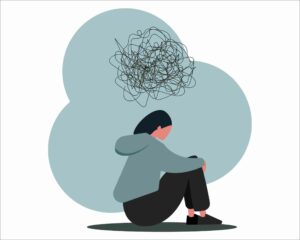Depression is a mental illness that affects millions of people all around the world. It can cause feelings of sadness, hopelessness, and worthlessness that can be difficult to overcome. If you are struggling with depression, know that you are not alone. There are many coping strategies for depression that can help you manage your symptoms and regain your happiness. In this blog post, we will discuss 10 of the best coping strategies for depression!
Contents
What Is Depression
 Depression is defined as a mental health disorder characterized by persistent sadness and a loss of interest in activities that you once enjoyed. It may also be accompanied by low energy, sleep disturbances, and difficulty concentrating. While depression is not a “normal” part of the aging process, it is estimated that 20-30% of older adults will experience some form of depression in their lifetime.
Depression is defined as a mental health disorder characterized by persistent sadness and a loss of interest in activities that you once enjoyed. It may also be accompanied by low energy, sleep disturbances, and difficulty concentrating. While depression is not a “normal” part of the aging process, it is estimated that 20-30% of older adults will experience some form of depression in their lifetime.
There are many different types of depression that can occur, each with its own set of symptoms. Major depressive disorder is the most common type of depression, characterized by a loss of interest in activities, feelings of sadness or emptiness, and fatigue.
Persistent depressive disorder is a less severe form of depression that can last for years and is characterized by a persistent low mood. So, whatever your particular type of depression, it’s important to know that you are not alone and there are effective coping strategies that can help.
So you must be wondering, what are some effective coping strategies for depression? Let’s talk about each strategy in detail for a clear understanding.
10 Coping Strategies For Depression
Sometimes depression can feel like it is taking over your life and you will never be happy again. So finding and implementing some strategies is important. Hence, we are going to discuss 10 coping strategies for depression that have been proven to help. These include:
Stay active
This is an important part of managing your depression. While it may be the last thing you want to do when you are feeling down, getting up and moving will help. Just a small amount of activity can make a big difference. A simple walk around the block can help clear your head and improve your mood. There are numerous ways to get moving and conversely uncountable benefits, such as:
- Improved physical health
- Light mood
- Endorphins release
These are just a few of the benefits, so it is worth getting active even when you don’t feel like it. And, there are many activities to choose from:
- Cardio workouts
- Outdoor activities
- Team sports
- Individual sports
- Hobbies
Regardless of what you choose, make sure it is something that you enjoy.
Dietary changes
 Your diet is closely linked to your mood, so it’s no surprise that what you eat can affect how you feel. If you’re struggling with depression, making some simple changes to your diet may help ease your symptoms. As what you eat can affect your mood, it’s important to make sure that you’re getting the right nutrients.
Your diet is closely linked to your mood, so it’s no surprise that what you eat can affect how you feel. If you’re struggling with depression, making some simple changes to your diet may help ease your symptoms. As what you eat can affect your mood, it’s important to make sure that you’re getting the right nutrients.
Increasing the amount of omega-three fatty acids in your diet is a good place to start. These healthy fats are found in fish, nuts, and seeds, and have been shown to boost mood. In addition to omega-three fatty acids, foods that you should include in your diet are:
- Fruits and vegetables: Dark leafy greens, citrus fruits, berries, and tomatoes are all good choices.
- Whole grains: Choose whole-grain bread, pasta, and cereals over their refined counterparts.
- Protein: Lean protein from sources like chicken, fish, tofu, beans, and nuts can help improve your mood.
- Probiotics: These “good” bacteria are found in yogurt, kefir, sauerkraut, and kimchi. Probiotics may help ease depression by reducing inflammation.
Meditate
It is hard to quiet an anxious mind, but meditation can help still the thoughts that are racing through your head. Studies have shown that mindfulness meditation can be as effective as medication for some people with depression. It is an easy and free coping strategy that you can do anywhere, anytime.
For instance, you can:
- Sit quietly for a few minutes each day and focus on your breath
- Focus on a mantra or positive phrase that you repeat to yourself
- Pay attention to the present moment without judgment
You can find more information about how to meditate here. Daily practice of meditation can actually leads to changes in the brain, and it is one of the most effective coping strategies for depression.
Spend time outdoors
Nature is not only beautiful, but it can also have a positive impact on our mood. Studies show that spending time outdoors, especially in green spaces, can help reduce symptoms of depression. So go for a walk in the park, sit by the lake, or spend some time in your backyard. Just make sure to get some sun—vitamin D has been shown to be beneficial for people with depression.
In addition, you can also do some activities by spending time outside. Activities like hiking, swimming, or playing sports can help reduce stress and improve your mood. Even it will also help you to make friends and socialize.
Keep a journal
Journals are a great way to express what you’re feeling without having to worry about judgment. You can write as much or as little as you want, and there’s no pressure to share it with anyone. Also, journaling is as easy as keeping a notebook and pen with you at all times, so there’s really no excuse not to do it. For example, you might want to write about:
- How you’re feeling today
- What are your triggers
- What makes you feel better
- Your goals for the future
If you don’t know where to start, try looking online for journal prompts. There are tons of them out there, and they can help you get started. In fact, you can even find journal prompts specifically for depression. That will help you get in the habit of writing, and it will give you some ideas of what to write about.
Prioritize sleep
 Sleep is an essential function of our bodies and our minds. When we don’t get enough sleep, it can lead to a host of problems, including depression. For example, if you continuously have trouble sleeping, you may start to feel hopeless and helpless.
Sleep is an essential function of our bodies and our minds. When we don’t get enough sleep, it can lead to a host of problems, including depression. For example, if you continuously have trouble sleeping, you may start to feel hopeless and helpless.
One of the best things you can do for your mental health is to prioritize sleep. If you’re having trouble sleeping, there are a number of things you can try, such as: avoiding caffeine before bed, establishing a regular sleep schedule, and creating a relaxing bedtime routine. More often you should never drink alcohol before bed, as it can disrupt your sleep.
Set realistic goals
It can be easy to get overwhelmed when you’re depressed, and setting unrealistic goals only makes that worse. Instead, focus on setting small, achievable goals that you can realistically accomplish. Once you’ve accomplished a goal, you’ll feel a sense of achievement and accomplishment- two things that are often lacking when you’re depressed.
One study has found that people who set small, achievable goals are more likely to experience a reduction in depressive symptoms. So start by setting yourself some simple, achievable goals- and then go out and accomplish them.
Distract yourself
It is easy to get caught up in your own head when you are feeling depressed. One way to combat this is to find things to distract yourself from your negative thoughts. This could be anything from reading a book, watching a movie, or going for a walk. The important thing is that you find something that takes your mind off of your depression.
For example, if you are feeling depressed about a recent breakup, you might distract yourself by going out with friends or taking up a new hobby. If you are feeling depressed about a job loss, you might distract yourself by looking for a new job or volunteering. The key is to find something that helps you take your mind off of your thoughts.
Challenge your beliefs
Another way to cope with depression is to challenge your negative thoughts. When you are feeling down, it is easy to believe that everything is bad. However, this is not always the case. If you take the time to question your negative thoughts, you may find that they are not as true as you initially thought.
In fact, these beliefs can be changed. If you can identify the thoughts that are making you depressed, you can start to challenge them. For example, if you believe that you are a failure, ask yourself why this is true. What evidence do you have to support this belief? Once you start to question your negative thoughts, you may find that they lose their power over you.
Talk to your loved ones
 Finally, one of the most important things you can do is to talk to your loved ones about what you’re going through. It can be difficult to open up, but it’s vital to have a support system. Your loved ones can offer practical and emotional support, which can be extremely helpful.
Finally, one of the most important things you can do is to talk to your loved ones about what you’re going through. It can be difficult to open up, but it’s vital to have a support system. Your loved ones can offer practical and emotional support, which can be extremely helpful.
Because if you tend to keep your feelings to yourself, it can lead to feeling isolated and alone – which can make depression worse. So reach out to your loved ones today and let them know what’s going on. They can be a huge source of support and understanding.
So there you have it – ten coping strategies for depression that actually work. If you’re struggling with depression, we encourage you to try some of these out. And remember, you don’t have to go through this alone. Reach out to your support system and get the help you need. These are just a few ideas to get you started, but there are many other resources available. Do some research and find what works best for you.
When To Seek Professional Help?
Although it is not easy to ask for help, if the depression is proving to be too much to handle on your own, it may be time to seek professional help. Let’s discuss some warning signs that are indicative of this.
- Withdrawing from friends and activities
- Impacting your job or school performance
- Not enjoying things that used to bring you happiness
- Sleeping too much or having trouble sleeping
- Eating too much or not being able to eat
- Experiencing overwhelming guilt or worthlessness
- Losing interest in your appearance
- Choosing alcohol or drugs to manage the depression
- Thinking about death or suicide
These are some warning signs that things have gotten out of your control and professional help is needed in order to get better. If you or someone you know is experiencing these symptoms, please reach out for help. There are even emergency services that are available if you or someone else is in immediate danger.
The most important thing to remember is that you are not alone and there is help available. Do not suffer in silence, reach out today. Let’s further discuss how some professional help can be of assistance.
Types of Professional Help Available
 There are many types of professional help available and the most important part is finding what works for you. Some common professional treatment includes:
There are many types of professional help available and the most important part is finding what works for you. Some common professional treatment includes:
Cognitive behavioral therapy
This is a type of therapy that helps you to identify and change negative thinking and behavior patterns. It works through a process of identifying your thoughts, feelings, and behaviors that contribute to your depression. Many people find cognitive behavioral therapy to be helpful in managing their depression.
Interpersonal therapy
This is a type of therapy that focuses on your relationships and how they may be affecting your depression. It can help you to identify and change negative patterns of communication and behavior in your relationships. Interpersonal therapy is often used in conjunction with other forms of treatment, such as medication.
Psychodynamic therapy
It is a form of therapy that emphasizes the role of the unconscious mind in shaping one’s behavior. The therapist will help you to understand how your past experiences are affecting your current behavior. For instance, you might have developed a coping mechanism to deal with a difficult situation that is no longer helpful.
Support groups
Many people find it helpful to join a support group. This can provide valuable social interaction and allow you to share your experiences with others who understand what you are going through. There are many different types of support groups available, so it is important to find one that is right for you. You may want to consider joining a group that meets in person or online.
Medication
It is important to talk to your doctor about your options for medications and find one that works well for you. There are many different types of antidepressants and other medications that can be helpful in treating depression. Some commonly prescribed medications are:
- Selective serotonin reuptake inhibitors (SSRIs)
- Serotonin and norepinephrine reuptake inhibitors (SNRIs)
- Tricyclic antidepressants (TCAs)
- Monoamine oxidase inhibitors (MAOIs)
- Atypical antidepressants
Other medications that may be helpful in treating depression include:
- Mood stabilizers
- Anti-anxiety medications
- Stimulants
It’s important to remember that no one type of treatment is the “right” answer for everyone and that it may take some trial and error to find what works best for you. If you are considering medication for depression, it’s important to talk to your doctor about the potential risks and benefits.
Conclusion
Conclusively, coping strategies for depression are essential for anyone suffering from the disorder. While there is no one-size-fits-all solution, try out different techniques and see what works best for you. Be patient with yourself, and don’t hesitate to ask for help when needed. With time and effort, you can start to feel better.
If you are struggling with depression, know that you are not alone. Help is available, and there are people who care about you. Seek professional help if your symptoms are severe or if they are impacting your ability to function in daily life. Depression is a serious condition, but it is treatable. With the right support, you can start to feel better.
For more tips and guidance, you can reach out to Therapy Mantra. The team of professional counselors is more than happy to help you in your journey to recovery. Contact us today to learn more about our services. You can also book an online therapy session or download our free Android or iOS app.


